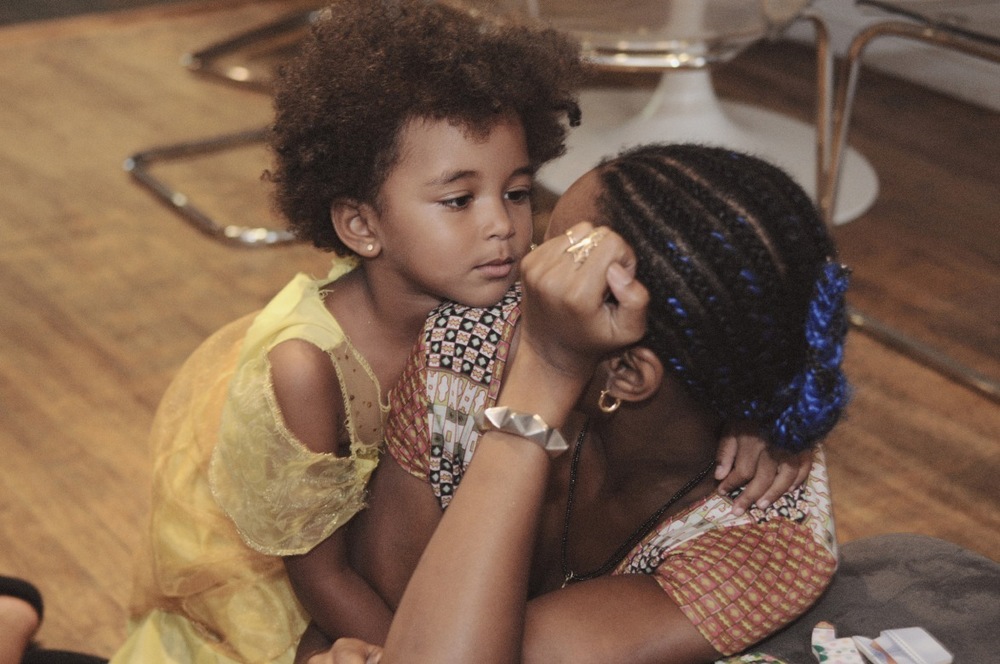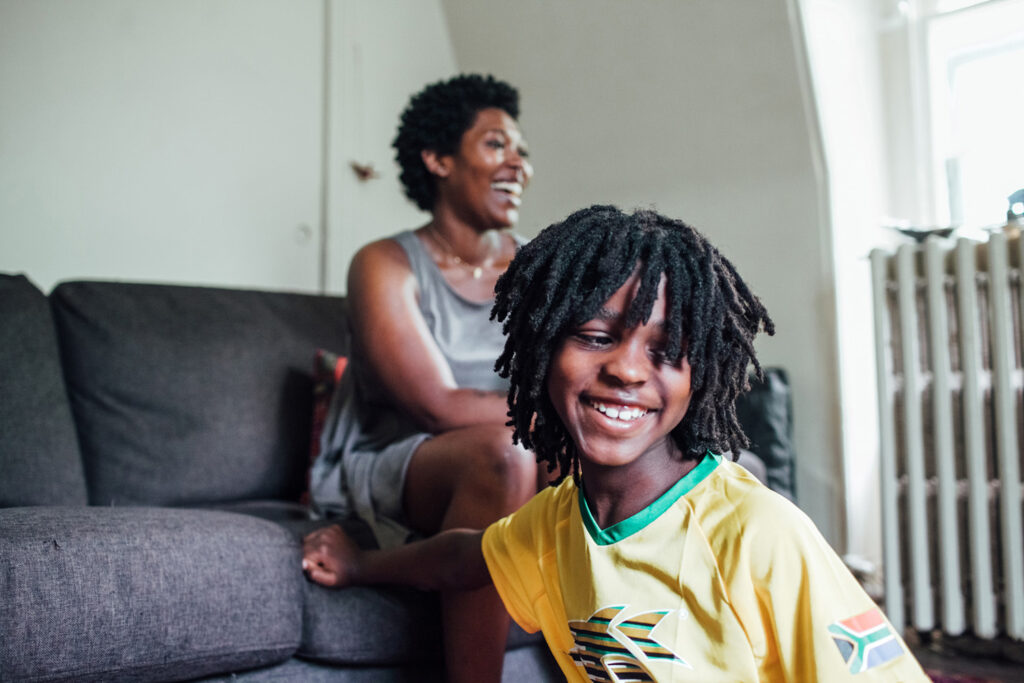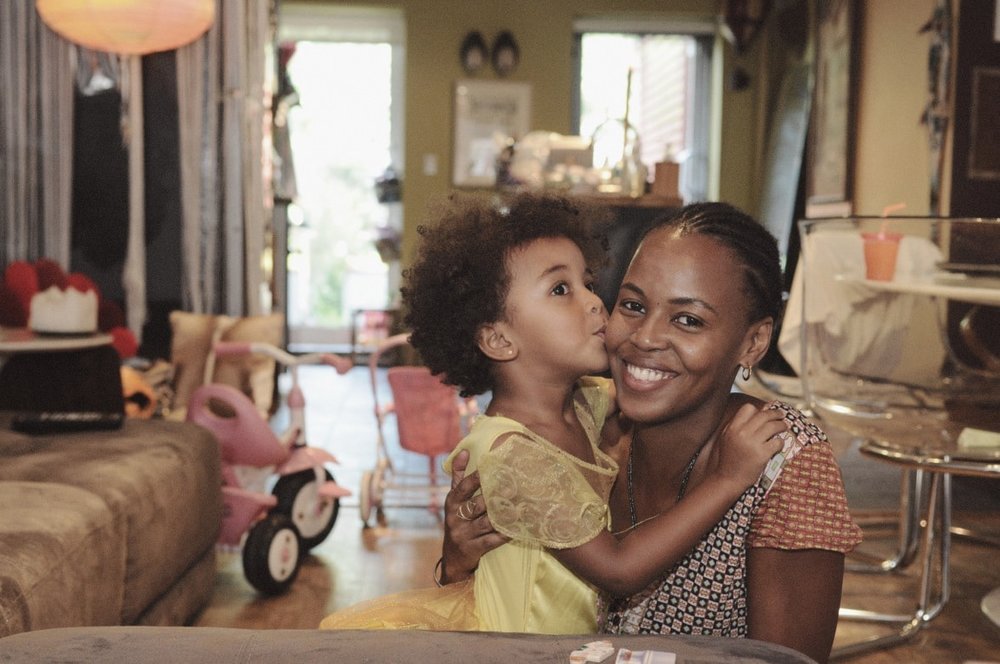It’s an oft-repeated maxim that one must suffer for their art—but what happens when you become a mother? Priorities have to shift, a fact that sculptor and mixed-media artist Wangechi Mutu has mastered without compromising the power of her work. With her 3-year-old daughter in tow, the expecting mom spoke with mater mea about how she creates her art pieces while still being a very present mother.
The walls in Wangechi Mutu‘s in-home studio are practically alive. Pieces of fabric and paper from Mutu’s mixed-media collages jut out as if it just had a notion to pry itself from the canvas. Further down one finds a long row of sculpted masks that look out at you like a council of unseeing ancients.


It doesn’t seem like the right setting for a princess or her finery. But it’s here that 3-year-old Neema Lazzaroni decides to create a pile of the tulle, tutus, lace, and sequins that makes up her enviable princess dress collection.
“This one is my favorite,” Neema, the artist’s daughter with her husband Mario, declares. She proudly holds up a lime green dress before switching to a bright off-the-shoulder yellow dress with ruched tulle along the skirt. “I mean this one.”

Wangechi Mutu watches her daughter go through piece by piece, her eyes crinkling with amusement. “I don’t know if it’s wired into girls,” she said of her daughter’s current princess phase in her lilting Kenyan accent. “[But] It’s fine. It’s helping her imagination.”
It’s no surprise that an active imagination is important to Wangechi Mutu. While Neema creates a world where fairy princesses and hedgehogs come over for tea parties, her mom has captivated the art world with the products of her own inner world. The complexity of her sculptures and collages of fractured black women pull you in just as it threatens to push you away with a grotesque detail—it’s a beauty that’s hard to look at.
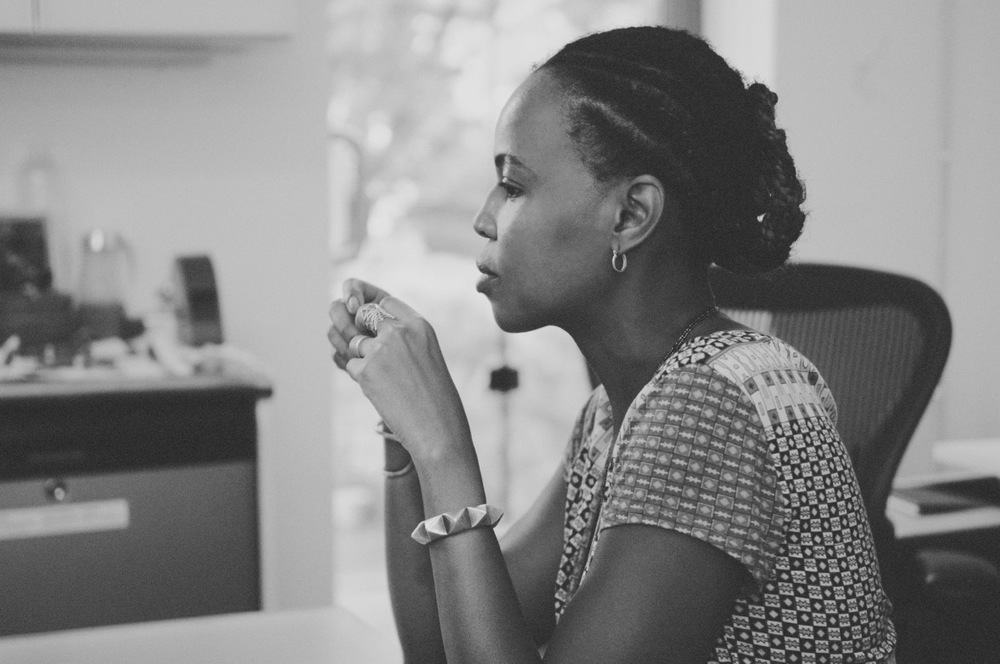
Mutu’s work has earned her many accolades, including the Deutsche Bank’s “Artist of the Year” award; right now she’s at the tail end of her fourth solo show titled Nitarudi Ninarudi (Kiswahili for “I plan to return I am returning”) at Susanne Vielmetter Los Angeles Projects.

“I have other shows coming up next year,” Wangechi Mutu said with a tired laugh. “Mostly museum shows with earlier work that I’m bringing together to recontextualize them, so people can see them for the first time in Sydney, North Carolina [and] the Brooklyn Museum. There’s a show in Germany right now actually. So it’s busy, very busy.”

Juggling the demands of a thriving art career with that of motherhood is impressive, but the fact that Wangechi Mutu is also seven months pregnant makes her balancing act seem almost Herculean. It’s a difficulty Mutu acknowledges with her characteristic matter-of-factness.
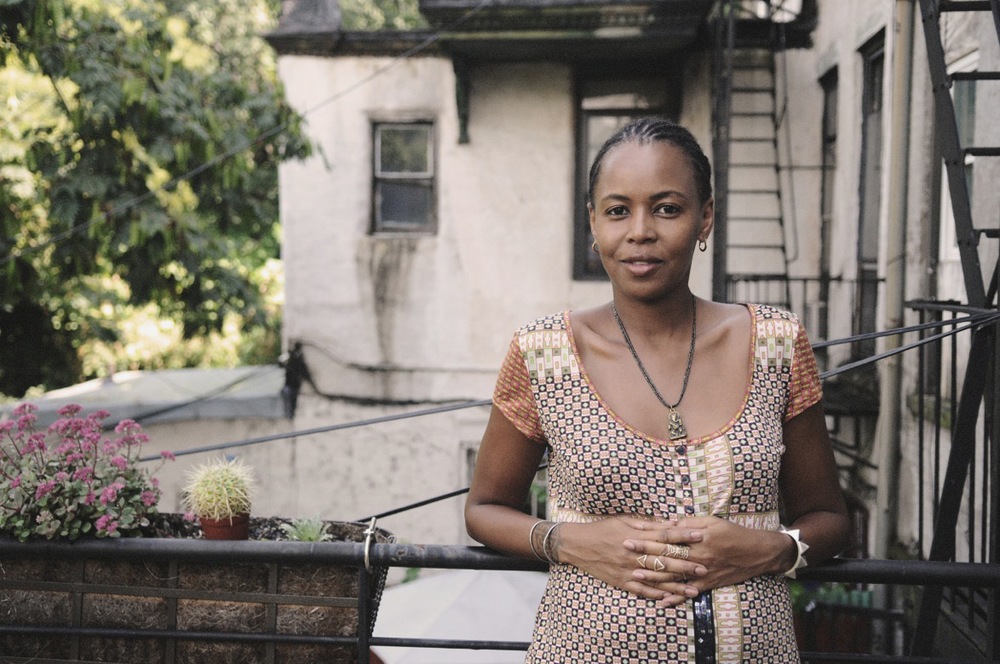
“I love, and I’m obsessed, with making my work,” Wangechi Mutu explained. “I’m not one of those people that struggles to come back in the studio; I would love to be here much longer. It comes down to being very disciplined. You can’t really postpone a child’s needs. If she’s back home with the babysitter and it’s time to have dinner, I can’t say, ‘Oh well, I need to work another hour-and-a-half more.’ No, her appetite says now.

“Before, I could stretch things and get things done last minute,” Wangechi Mutu continues. “I could do these 14-hour days, stay up to some obscene hour, and then sleep when I’m done with the show. I can’t do that [now]. I’ll get sick. Your body won’t let you. So it’s about being more grown-up. Ultimately you want to be with the child, but there’s some things you have to try and delegate. I have an outstanding team.”
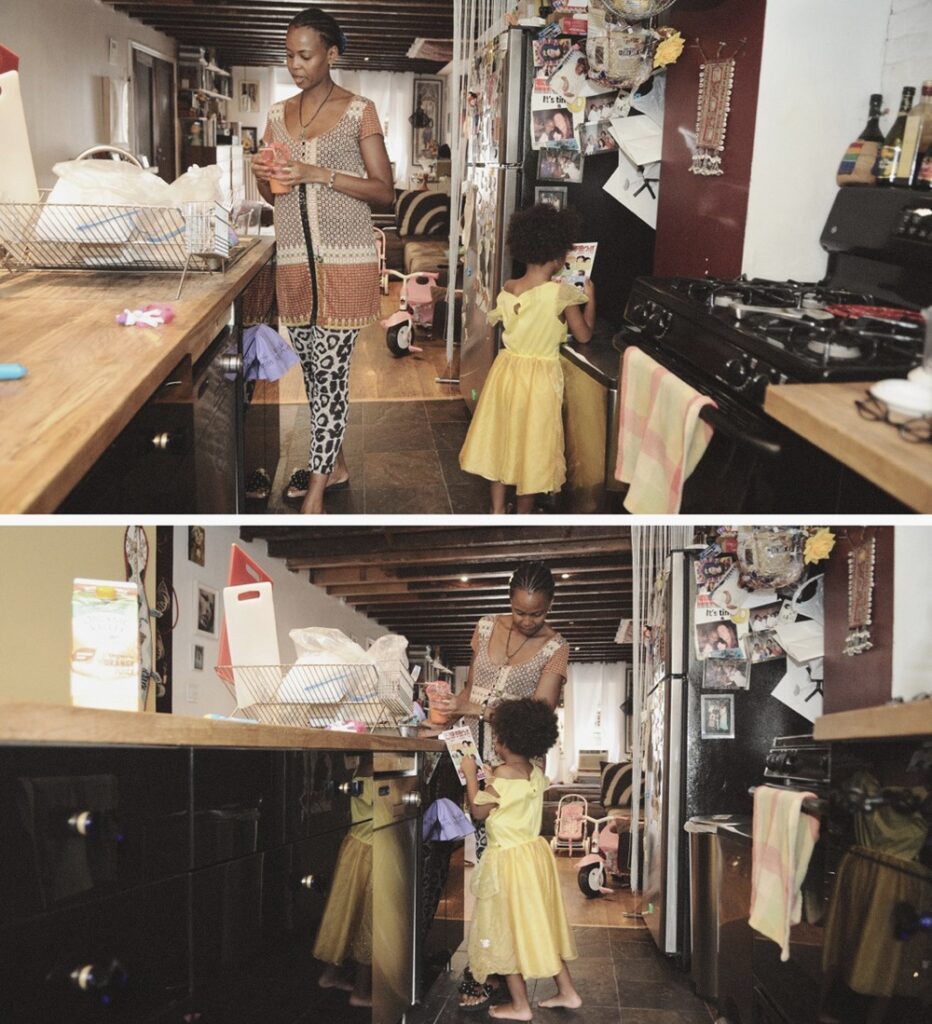
The decision to be “more grown-up” can come with an array of conflicting emotions, according to Wangechi Mutu. “I think being a mom [means there are] very internal things related to how your body feels and what is going on inside that are very difficult to communicate.
“[But] I love being a mom most when I’m most challenged with [the] things that are [in] my life, that I’ve created,” she says, looking around her studio. “I’ve kind of just swiveled my head towards the fact that I have my girl, my family, my husband here, and it gives me a sense of calm. It’s so much more difficult to create a creative life of my own than I think it is to create [my art] pieces, for me.”

As Wangechi Mutu finishes her thought, Neema has put on her favorite yellow dress, the cutaway cap sleeves barely staying up on her slender shoulders. She takes her mother’s hand and they leave Mutu’s studio behind, heading into another world of make believe.
“Momma, there’s a monster coming!” Neema screams, a mischievous grin lighting up her face

Monster attack narrowly avoided, Wangechi Mutu and her daughter settle onto the couch to play with a mix-and-match puzzle of the Three Bears. The directions on the back show one possible configuration, with Momma Bear wearing a skirt and blouse, Poppa Bear wearing a suit jacket and slacks, and Baby Bear wearing a t-shirt and shorts.

“Did I do it right, momma?” Neema asks, taking a step back to observe her work.
Wangechi Mutu takes a look. “You did that right, Neema, but you can do it however you like.”
It’s an important lesson for any artist… or princess.

Q&A
IS THERE A DIFFERENCE BETWEEN HOW YOU FELT DURING YOUR FIRST PREGNANCY VERSUS THIS ONE?
Yes, [I am] four years older. I literally can tell that I’m a different person, so I’ve been more strict about my exercise because I’m just not as resilient as I was four years ago. And also I think when you have another child, you’re running around. Your energy is being spent already. I know I’m trying to get a ton of things done before the baby comes.
I think if I had decided to have a second child maybe a year after Neema or something, my body would have been in a different place. I’m 40 now. I’ve always seen the way bodies changed [and] I’ve always been in touch with my body’s changes throughout my artist career.

I also feel that [with this pregnancy] my energy is affected by the fact that I have another one, expecting me to be there for her. [I noticed] when I traveled—even for a short amount of time—and I came back, she was clingier. You can’t come back and relax and take a break.

HOW DOES SHE FEEL ABOUT BEING A BIG SISTER?
She’s so far acting like it’s amazing and she’s ready. Her best friend has a little brother, so she knows what that is, but they all behave differently. She’s acting one way now because there’s no one around, just my belly. But she’s excited; she kisses my belly all the time.

HOW DID YOU FEEL WHEN NEEMA WAS BORN?
I was so relieved. When I first saw her, I was so exhausted. To the point where I think women are just like, “Get this thing out of me!” [I felt like], “Finally, this is what I was struggling to do.”
But I was also so thrilled to see this full, beautiful, perfect little creature. You know, you’re just very grateful. You have no idea. There are things that machines can test for, but when the baby comes out, and you really see them and hold them and touch them and see them acting alive, it’s so reassuring. It’s a long journey to take, and for things to go wrong, I can’t imagine how difficult it would be at that point. I was in heaven. I was so happy; I was so relieved.

It makes it clearer how little time that we have, which I didn’t expect. I wasn’t aware of that, until she came along. This little girl next year will be this age and I want to have [these] things done. You get a sense of that [as a mother]; kids are such an indicator of time passing because their requirements are so specific and you can’t postpone them.
It’s made me very clear about my relationships and not in a way that I’m dismissive of my friendships. I’m way clearer about which friendships are truly meaningful and caring of who I am as a whole person. Some people can’t deal with the part of [you that’s] a mother. You’re not the person who stayed up with them until 4 a.m. drinking wine and talking about Art and music.

It takes time for people who don’t have kids to get used to it. Your friendships start to rank themselves. Some of them are organic and some of them you end up having quiet divorces.
I think of family differently. I realize what having cousins meant. I look at my parents’ relationship to their siblings and it’s not like they were that close. But they wanted us to hang out together. I realize that more than I ever did before. I was raised around tons of cousins. They wanted us to know who our people are.

HOW WOULD YOU DESCRIBE NEEMA’S PERSONALITY?
She’s a very sweet, very conversational person. She’s very communicative, very expressive. She’s very uninhibited when she’s allowed to be herself—she starts off very shy when you first meet her, but then she’ll show you what she likes. She’s also very honest; she’s only three-and-a-half, so she says what she feels. But I think she also has a very truthful, courageous, little mouth.
She’s a hugger [and] she tells stories. She ponders things, she imagines things. She has very elaborate and incredible nightmares, and she’ll tell you about them, and then you can’t bring them up again. Even in the daytime, she says, “Don’t talk about it.”
She’s very daring. She’s jumped into pools, and we’ve put her in swim lessons now because she didn’t realize she couldn’t swim. I was swimming when I was pregnant with Neema; she loves water, and I always wonder if it’s because of that. She will never believe she can’t swim. She’ll climb up things, and try out stuff. She’s very adventurous.

FILL IN THE BLANK: I LOVE BEING A MOM MOST WHEN…?
When my daughter and I are hanging out together in the bed. We’re not a particularly super religious pair, Mario and I, but we were both raised religious and we’re very spiritual. After having her, a friend of mine told me, “Well we weren’t raised agnostic, and we had the option to be how we are, so maybe it’s her turn to have a little bit of spirituality and religion and all that so that she can decide,” and that’s actually a good point. So we say a little prayer for her before [bedtime]. We have a moment where we say thank you for different things to God.
I don’t give an explanation about who God is, but I think she’s innately in touch with [and] loves the idea of powerful, mysterious things. I don’t know where it came from, but she loves the things that are in her imagination.
She’s also very interested in the unknown something out there. So the idea of saying “thank you” in general to this abstract thing is interesting to her.
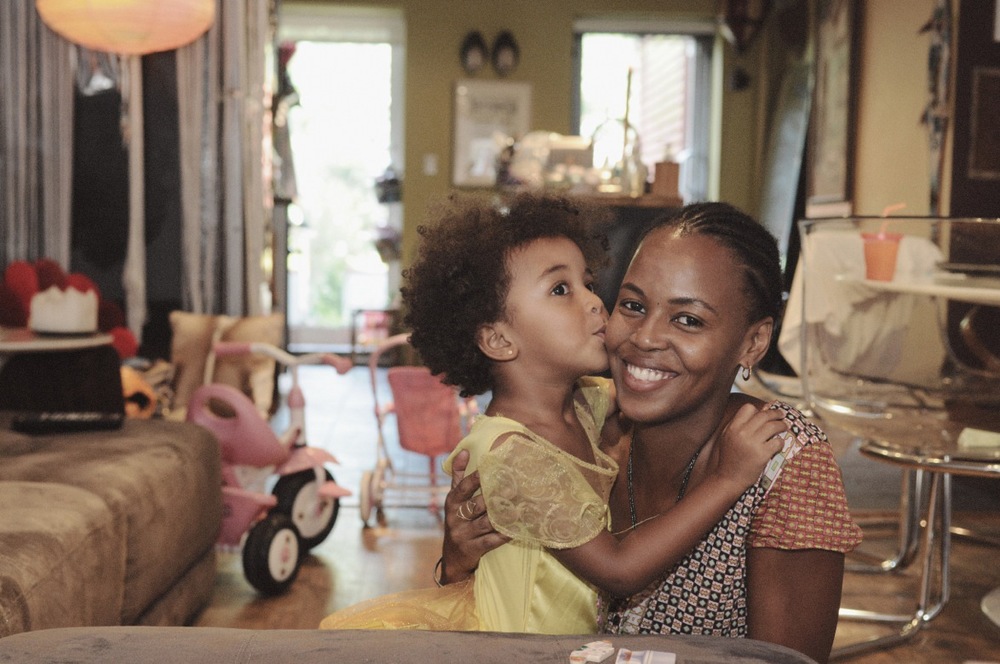
It’s a very beautiful time, because she’s starting to think about the things that she cares about. I love that moment. I’m not telling her how to identify [what she cares about]. I love to hear her attachment to things. She’ll say, “I love my Baba and I love ice cream and I’m so glad I had a playdate.” (Laughs) So those moments are lovely, when we’re laying together and remembering our day.

WHAT’S YOUR MOTHERING PHILOSOPHY?
I come from a very disciplinarian African home, [but] my theory is that kids come to us wild and feral and free. You can [either] squash that, or you can help them figure out how to control that amazing instinct to just be and do whatever they want to, without oppressing them.
But they need boundaries. They behave so much better when they have boundaries. They appreciate boundaries. So I’m not a big [on letting] the kids walk all over the table because they’re kids. Kids will hurt themselves if you let them. I think kids will be nasty to one another if you let them—they actually don’t know good or bad, they don’t know all these things. I’m a big believer in slowly introducing boundaries [to] them, because you see them relax. They’re like, “Oh, we can’t do that? Okay.” And then they bounce around everywhere else and do crazy things somewhere else.

WHAT INSPIRES YOUR HOME DÉCOR?
It’s a combination of what I like to be around aesthetically, but also how the space works. Some of [the art] I’ve traded with artist friends, some of it I’ve acquired. There’s a little bit of my own work here.
We never actually childproofed. This is the difference between having a girl and a boy. We were lucky enough that we just honestly moved a few things out, and never put guards. Girls react to language so powerfully that if you tell [them] a couple of times in a little bit of a scary voice, they don’t touch things. So all that was left over throughout her baby years, and she truly never touched anything. I’m not sure what’s going to happen [if we have a boy], because all the boys who visit enjoy breaking things.

ARE YOU TRYING TO INCORPORATE YOUR IDENTITY AS A KENYAN WOMAN INTO THE LESSONS THAT YOU GIVE NEEMA?
Yeah, I guess what I want her to define [herself] as is one of the things I’ve become a lot more astute and reflective about. So as an intercultural family—both [my husband and I] not being American, both of us being very cognizant that we come from specific and proud cultures—we’ve definitely thought a lot about the fact that we’re raising an American child. We want to make sure that she understands that her heritage is also from other places, [and] that she’s Kenyan and Italian.
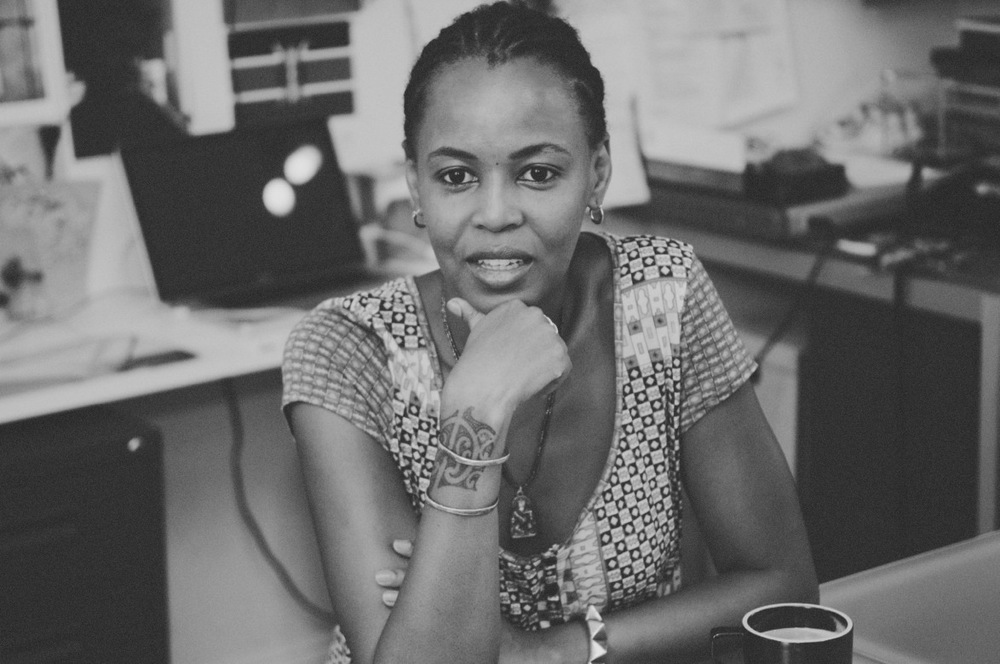
That actually came up quite a bit with [teaching her our] languages, her meeting her grandmothers and grandfathers, and having our family being involved. You have to think about the movies and the music and what she reads, the kind of dolls and toys and things she has around her that build a sense of who she is.
I’m way more sensitive about culture—I always have been, because that’s what my work is based on. [There are] racial identifiers that you find everywhere that either negate people’s existence or overemphasize others, so I try to be very cognizant of that and make sure that in her toys, she’s seeing herself.

I’m trying to insist on her seeing animations that have African characters. They’re really difficult to find but they’re there, and there’s a few of them. We find them online. She’s definitely watching a few Italian shows as well.
We try to infuse in her the understanding of what she [is]. They get it naturally—you see your parents, you just believe the world is that way: that there are people who are one color and another, and speak one language and another, and it’s normal. So we don’t have to tell her that. What we have to keep telling her is that it’s not abnormal. But she hasn’t gotten to that stage yet. At this age, kids are pretty non-racial.

HOW HAVE YOURS AND MARIO’S UPBRINGINGS OUTSIDE OF THE STATES AFFECTED HOW YOU RAISE NEEMA?
We’re cognizant of the fact that we’re not raising her where we were raised. We were both raised in poor economies; Southern Italy and Kenya can be kind of comparable in some ways: They’re both very corrupt and mismanaged, but at the same time the people are very, very rich in culture and curious and quite warm.


Right now, we’re in a comfortable home, and live a comfortable lifestyle, and I hope that she understands that that’s not how everybody’s life is, that these things aren’t to be taken for granted. So we do try to instill [that] in her. [But] it’s very difficult in a materialistic culture with this many toys. I mean, I probably had this many toys my entire childhood!
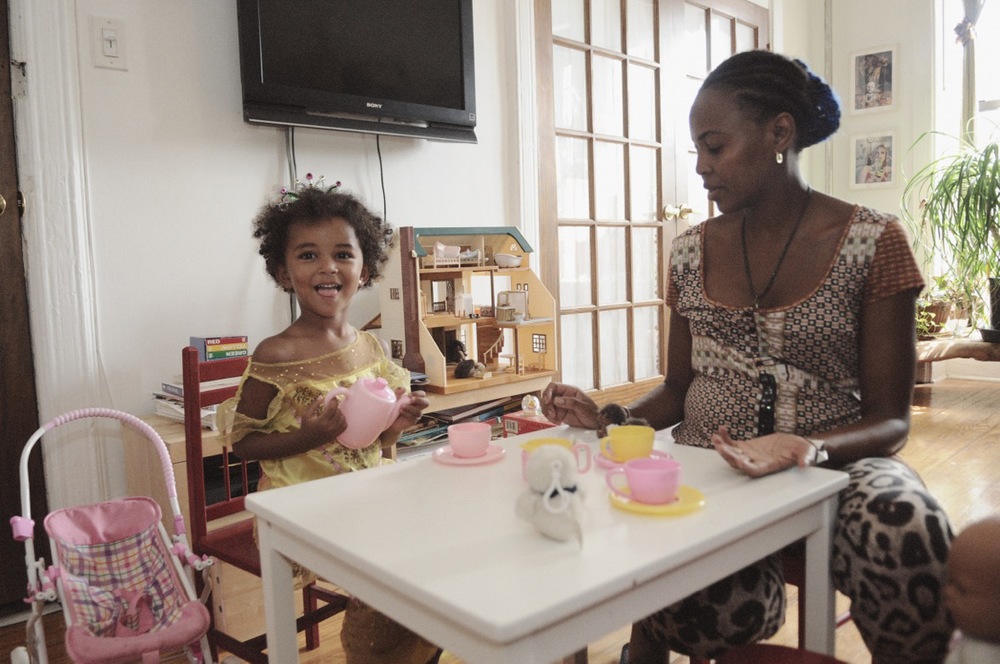
I was raised in a family that was [very] conservative, I think, because of the time and a variety of things. It wasn’t an upbringing or a place where you felt as a girl that you could go get what you wanted. So I fought quite a bit to untangle myself and be myself: be an artist, be successful at it, be independently minded, [and] try to ignore the discouragement.
I don’t want Neema to have to worry about that. I don’t know if having that kind of lack of encouragement is what builds a stronger person? (Laughs) Like if you hold someone down, [is] the fight that they have to put up what actually makes them stronger? I have no idea, but I’m hoping that it isn’t.

WHAT KIND OF WOMAN DO YOU HOPE NEEMA GROWS UP TO BE AND WHAT ARE YOUR HOPES FOR THE WEE ONE THAT YOU’RE EXPECTING?
I really don’t want to overimpose what she is. I see her as she is now, and if she grows up to be the mature, bigger version of what she is now, then I’m thrilled, because she’s really a strong girl.
[I want her to be] healthy, smart, and athletic. I want her to understand that’s she’s got no limitations in what she can do; I don’t want to be one of those parents or adults who is like “Um, you can’t do that.”
I feel in my raising, you were taught to be reserved in terms of communication. Not necessarily [so with] Mario’s southern Italian culture, but my middle-class Kenyan upbringing was a lot more reserved and repressed. Hopefully she doesn’t lose her honesty.
